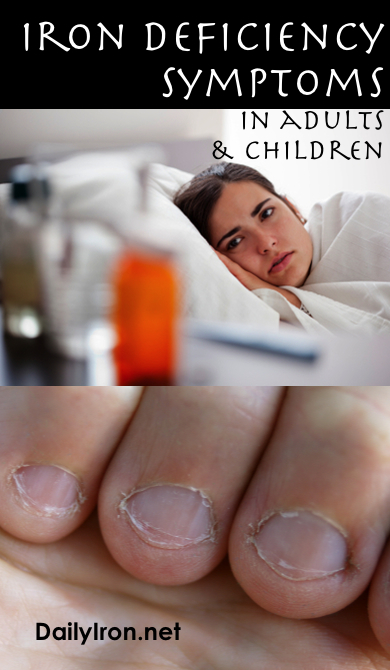Iron deficiency is sometimes difficult to identify because the symptoms are similar to those from a host of other ailments. In fact, it is easy to go for a long time with symptoms thinking that the cause is something else entirely. Symptoms include:
- Weakness
- Fatigue
- Reduced color in the face (a pale look)
- Heart palpitations
- Cold hands and feet
- Tingling hands and feet
- Pica (craving unusual items like ice, salt, and clay)
- Brittle fingernails (flattened and then turned up on the corners, like “spoons”)
As with any condition, you may not display all of these symptoms. (In fact, you may have a few other unusual symptoms instead.) If you are concerned that you are iron deficient, the easiest thing to do is ask your doctor to order blood work.
In Children
The iron status of infants and young children is watched carefully by pediatricians in the United States because of the impact of iron on a child’s physical growth and brain development. If your child displays iron deficiency symptoms, do speak with your child’s doctor immediately.
Iron deficiency symptoms in children include:
- Slow growth rate in stature. A child may be small for his or her age but if his or her rate of growth is below children of the same age, doctors may become concerned. That is, if the child is expected to grow three inches in a year but only grows by one inch in height, the pediatrician may order follow-up tests.
- Slow weight gain. As with a child’s change in stature, children should gain weight within an expected range. If a child is expected to gain seven pounds in one year and gains only one pound, the child’s pediatrician may order iron blood work (or other tests depending on the child’s history).
- Reduced school performance. Iron is an important mineral for brain function and is critical in a child’s performance at school. If a child suffers from low iron and that iron status is improved, so too may his or her school performance.
- Poor behavior. As with school performance, a child’s behavior is affected by his or her iron status. The iron-deficient child may be hyperactive or show signs of attention deficit.
Talk to you child’s pediatrician about iron blood work if you are concerned about the child’s iron status. Iron deficiency is common and if your child is displaying any of these symptoms, bring up the issue at your next doctor’s appointment.

